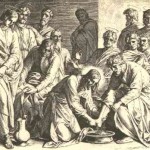Replay: He washed their stinkin’ feet
About a year ago, I published a post called “He washed their stinkin’ feet.” Thinking about and writing this article really affected me. I think the act of washing the disciples feet became even clearer to me last summer when I went to Ethiopia. There, they wash your hands before a meal. I’d love to hear your thoughts on this article.
—————————————————————
On the night before his crucifixion, Jesus had a nice meal with his closest friends and followers. He tried to explain to them the significance about what was going to happen. He used the bread at the start of the meal to represent his body that was about to be broken on their behalf and on behalf of all who would follow him. He pointed to the cup at the end of the meal and used it to represent his blood that would soon spill as the sign of the new covenant.
The people sitting around him didn’t get it. I’m not sure we get it today. Their relationship with Jesus was not dependent upon whether or not they “got it”. Today, our relationship with God through Jesus is not dependent upon whether or not we understand everything perfectly either.
Then, after dinner, after explaining once again that he was the one who would take away the sins of the world, after the apostles had already recognized him as the Son of God, after he had calmed storms and healed leprosy and cast our demons and raised the dead, after he all this… he washed their stinkin’ feet.
He dressed himself as a servant, knelt in the position of a servant, and wiped feed (at most) sandaled feet that had trod through dust, dirt, mud, trash… skubala. (How’s that usage, Bro. Dave? 🙂 ) That’s right… he scraped the “unspeakable filth” off their feet and between their toes. He lathered them up and scrubbed them with the cloth that was wrapped around him. He rinsed them off and dried them.
He did this one by one. He washed the feet of the sons of thunder who wanted to sit in places of prominence. He washed the feet of Thomas who would soon doubt his resurrection (as did the others, by the way). He washed the feet of Nathanael who had once said that nothing good could come out of Nazareth. He washed the feet of Philip who had been with him for so long but still didn’t know him. He washed the feet of Peter who would soon deny him twice. In fact, every pair of feet that he scrubbed and scraped would soon run away from him.
He washed Judas’ feet. He washed Judas’ stinkin’ feet!
Then, he did something completely, utterly, amazingly ridiculous. He said:
Do you understand what I have done to you? You call me Teacher and Lord, and you are right, for so I am. If I then, your Lord and Teacher, have washed your feet, you also ought to wash one another’s feet. For I have given you an example, that you also should do just as I have done to you. Truly, truly, I say to you, a servant is not greater than his master, nor is a messenger greater than the one who sent him. If you know these things, blessed are you if you do them. (John 13:12-17 ESV)
Did you catch what he said? He said, “I am your Lord (and he is) and I served you (and he did). How much more then should you serve one another.” WHAT?
Serve one another by doing things like that? He washed their stinkin’ feet!
Have you looked around lately? There are some filthy feet out there… some dirty lives… some filthy hands… some foul breath… some crooked teeth… some broken hearts… some wounded spirits… some dark souls. He wants me to wash those?
Who does he think he is?
This church is meeting for a real church service
Chris at “The Amplified Life” continues to tell us about their church’s plans to serve their community. The most recent post is called “5th Sunday is Coming.”
I linked to their “5th Sunday” plans a few weeks ago. They are planning to give up their “5th Sunday” church “worship services” in order to serve their community. Yes, I know that some churches are out and about in their neighborhoods serving all the time. But, I’m excited when I read about churches beginning to understand their responsibility to their neighbors.
Here is part of their plans:
So far we have four service areas for the day. First, we will be doing a litter pluck on the stretch of highway in our local community. Second, we will be doing a litter pluck in at a recreational area along the Delaware River (and this 5th Sunday is on Memorial Day weekend…there will be people present in the area–I wonder what God is going to do in that area?). Third, a few miles from our church there is a nursing home that we will visit and spend time with the the residents. I imagine a group of 30-40 people showing up to love on the elderly in the home and I cannot help but get excited! Finally, a smaller group will be be going to the home of a local widow to do some cleaning and yard maintenance.
I’m praying that this opportunity to give up their normal meeting in order to serve others will be the start of missional living for this church! I’m also praying that other churches see and follow their example. Finally, I’m praying that they are able to show their neighbors the love of God and introduce them to the good news of Jesus Christ!
In the NT, there is no distinction between clergy and laity
The title of this post comes from an entry in Dave Black’s un-pseudo-blog-type-thing. (See entry #2 from Monday, April 4, 2011 at 11:54 a.m.)
Here’s the entire entry:
The New Testament gives no suggestion that there is any distinction between clergy and laypeople. All Christians are called upon (and expected) to minister. In the New Testament, moreover, leaders came from within the Body and their leadership was always corporate and shared. There are few aspects of Christianity that demand a more radical reappraisal than its ecclesiology, if we are to be obedient to the call of Christ. If we are prepared to take the Scriptures seriously as the foundational documents of our faith, this will mean a complete rethinking of the wineskins and a return to the guidelines for Christian ministry as set down in the New Testament.
I think the key to this entry (besides the lack of distinction between “clergy” and “laity”) is this: “All Christians are called upon (and expected) to minister.”
What would it take for churches and Christians today to move towards this way of life in Christ?
Why do we expect Jesus to only be with the “righteous” today?
Yesterday, I was talking with someone about our relationship with God in Christ. When Jesus Christ walked the earth 2000 years ago, those who considered themselves to be “right with God” (i.e., righteous) often complained that Jesus continued to hang out with the dregs of society.
For example, look at this passage:
As Jesus passed on from there, he saw a man called Matthew sitting at the tax booth, and he said to him, “Follow me.” And he rose and followed him. And as Jesus reclined at table in the house, behold, many tax collectors and sinners came and were reclining with Jesus and his disciples. And when the Pharisees saw this, they said to his disciples, “Why does your teacher eat with tax collectors and sinners?” But when he heard it, he said, “Those who are well have no need of a physician, but those who are sick. Go and learn what this means, ‘I desire mercy, and not sacrifice.’ For I came not to call the righteous, but sinners.” (Matthew 9:9-13 ESV)
Tax collectors were rejected by the Jews. Yet, Jesus invited one to be one of his closest disciples, and he even ate at that sinner’s house. In other passages, Jesus was condemned for associating with prostitutes. Jesus surrounded himself with sinners, the lowest rung of religious society, those rejected by “the righteous.”
In response to this rejection, Jesus said two things:
1) God desires mercy, and not sacrifice.
2) Jesus is here for sinners, not the righteous.
How do we respond to Jesus’ words here? How do we respond to sinners in our society? How would Jesus respond? Is Jesus still with the sinners today, or does he only hang out with the righteous?
And, finally, how do we see ourselves? Are we the sinners or the righteous?
Guest Post: How does the church respond to poverty? (from someone who’s living it)
I think this is one of the most powerful posts that I’ve published in a long time. I can say that because I didn’t write it. Instead, a reader sent this to me. I asked for and received permission to post it here. Please carefully consider what she says. This is not a theoretical or academic exercise for her. She’s living it. For now, she wishes to remain anonymous. Here is her story:
—————————————————————————
I was struck by a recent post of yours, asking how the church should respond to the fact that over ten percent of the population in Raleigh lives below the poverty line. (She’s referring to this article.) Whenever I hear this sort of discussion come up, I want to speak up, but because my family is one of those who live “poorer” than most, I fear that my comments will come off somehow as ‘self-seeking’ or of ulterior motive, or just whiny. My family has struggled financially for the past several years, and without going into all the details, I will say it has nothing to do with wasting of money or unwillingness to work. My husband spent ten of the last twelve years working 70 hours a week at three different jobs, to pay our bills, before being laid off 18 months ago. We lost our very small home to foreclosure and now rent a small older house. And we are so grateful for God’s provision. It was a devastating experience, but as in everything, He used it to draw us closer to Him. People talk of living paycheck to paycheck…. we envy those who live that way, as we are usually spending next week’s paycheck three days before it’s here… haha.
We live cheap, and we get by, but any little emergency is a huge stressor trying to figure out how to pay for it. I tell you all this, not to try to make you feel pity.. PLEASE don’t… we are so blessed… but just to say that my opinions on the church and poor come from my experience. And we are hardly the worst case. My youngest boys get angry if i use the word ‘poor’ to describe us, and proceed to point out all the stuff we own. To them, poor people don’t have television sets (even if they are ancient and don’t receive any cable). Perhaps I should say we are poor by comparison to those in America, but rich compared to most of the world.
I went to a Sunday School class for several weeks the subject of which was ‘giving’. I was excited to consider my own responsibility and privilege to give, as well as the church’s as a body. I was so deeply discouraged to see how much time we spent talking about all the reasons not to help the poor… they are living out the consequences of their own poor choices, we might ‘enable’ the receiver to stay in a bad situation, the “not work/don’t eat” verses, and most saddening to me, all the stories of people who themselves had been poorer, but pulled themselves out of it, so others should be able to as well.
When I mentioned a friend of mine, who attends a different church, who has eight children, and feeds them on 60 dollars a week, I was hoping maybe someone would see it as a chance to live out what we’d been studying. Instead, there was a shrugging of shoulders and comments that pancakes for supper weren’t so bad. And they’re not. If you aren’t having them four times a week.
I don’t know what the perfect response is to the poor. But what seems to happen is some combination of this:
1. Assume the poor can’t do simple math and immediately ask to help them with their budgets. Because it’s very fun for a man to have another man peruse his income and expenses and tell him what a bad job he’s done in both.
2. Assume the person or family has committed some error or sin that has left them in their current situation. Because nobody in America is poor unless they are either lazy, foolish, or sinful.
3. Give some Bible verses or other encouragements. God’s Word is powerful, and never a bad thing to hear. But you can’t take it to the grocery store and trade it for a meal.
4. Spend lots of time being vexed over whether giving this person or family money is the ‘best’ use for it. As if God’s whole universal budget will be upset if we accidentally give to a less ‘worthy’ cause.
5. Combine all of the above steps so that the person or family feels as much shame as possible for their ‘sin’ of having less. Spend less. Budget better. Earn more. I call it “Nike Christianity”. Just Do It.
Perhaps an unintended consequence is that it drives people to the welfare agencies the church is often so quick to condemn. The woman taking my food stamp application listened more intently and with less judgement than many Christians had.
You learn fast that people get tired of hearing how broke you are. So when you’re invited out for dinner with a group of people, you make excuses so you don’t have to admit you can’t afford it. You or your children don’t go to retreats and other activities that cost money. You feel uncomfortable on Sunday mornings when you see how worn out your child’s shoes are, and know you can’t get a new pair for awhile. It becomes a slow and subtle path to isolation.
HOWEVER. While all I’ve said above is the usual (of my experience), there have also been instances of amazing grace and Christlike giving that have blown us away. At our darkest, deepest time of need, when we had lost our home and were moving into our current two-bedroom house with five children, a dear Christian sister offered my college age daughter to live with her, rent free. Months later, a group of friends insisted we go out to dinner with them, and before we could make any excuse, they made clear the meal was “on them”. When we hesitated, they made our presence seem so desired, we couldn’t say no. That evening, I saw my husband more relaxed, and truly enjoying himself, than I had in months. Another dear brother gave us a very large sum of cash to help us get through. He and his wife said said they so loved us, and wanted to help, that it was an actual ‘relief’ for them to give to us. That was a while ago. When I recently mentioned the gift to this same friend, he looked confused, and then said, “Oh. I completely forgot about that.” He FORGOT?!?!?! Didn’t hold it over us, or didn’t judge us, didn’t shame us. Just helped, and then forgot about it. But not about us, as they are dear friends.
So if you ask me what makes the difference in the ‘typical’ (my assessment), response, and the responses that made a real difference, I would say it is a difference in how you view “the poor”. Are the poor a “problem”? Are they “potential” converts or church members? Are they a good “project” for the church? Or are they ‘people’? God-created, God-loved, died-for people. Even if some people are in bad financial straights through their own devices, is that reason to refuse them help? If someone develops lung cancer from years of smoking, do we excuse offering compassionate care because they ‘did it to themselves’? I hope not.
I hope this doesn’t come off as a rant of bitterness. In truth, I am awed at God’s provision for us. Not big, not fancy, but way more than I deserve. And I am so thankful. And I think part of the reason Christians in America are so confused in our responses to the poor is because we are so rich. We lack empathy because we just haven’t been there. I wouldn’t know how it felt to be “poor” if I weren’t “poor”.
I’m so proud of these teenagers!
A group of teenagers, including my children and some very close friends, have been meeting together to eat and study Scripture for the last few months. A young college student has been helping them study the Bible, and he often provides the meal as well or he arranges with one of the parents to provide dinner.
But, last night, they did not get together to study the Bible. Instead, they got together to help each other live out what they had been studying.
A few days ago, they learned (from someone else) that an elderly couple needed help with yard work and with some things around the house. So, these teenagers (along with some friends they had invited) went to the elderly couple’s home and raked leaves, mowed the grass, moved furniture, and did a few other odds-and-ends for them.
I am so proud of them! It is one thing to meet and eat together. But, there is something special about teenagers willing to give up their evening to serve someone who can never return the favor.
What great examples to the rest of us!
Are you disadvantaged? Why not?
James at “Idle musings of a bookseller” has provides another awesome quote in his post “Whose advantage?”
The quote is from Keller’s book Generous Justice. Several people have told me that I need to read this book. If I keep seeing quotes like this, I just might spend the money on it.
Here is the quote from the book:
[T]he righteous [tzaddiq]…are willing to disadvantage themselves to advantage the community; the wicked are willing to disadvantage the community to advantage themselves.
And, here is James’ reply:
That is a heavy thought and a high calling. Am I willing to disadvantage myself for the advantage of the community? If I have the mind of Christ, I should be…
Good stuff. Very good stuff. As Saint Patrick said in his Confessio, we are the recipients of much grace and goodness from God. Now, how are we going to respond?
Elders at the gates
Felicity at “Simply Church” continues writing about leadership from a simple/organic church perspective in her post “What about elders and deacons?”
Given our recent discussions on my blog (specifically my post “Ministers in Scripture“), I thought my readers might be interested in Felicity’s post as well.
She begins with this:
The problem with words is that they change in meaning over the years. I would love for the word,”church,” to never be used because the word itself conjures up a building with a spire, or a denomination, or a meeting. But the word is Scriptural, and we can learn to use it rightly.
The same is true with words like elders and deacons. The words are Scriptural, but their meaning has become obscured by centuries of tradition.
The word for elder, “presbuteros” literally means an older person, someone who is more mature. He keeps an eye on (oversees) what is going on in the churches. The word for deacon, “diakonos” means servant.
In the remainder of the post, Felicity suggests that “elders” and “deacons” had more of a regional or city-wide function in Scripture. There are some indications that she is correct; but, of course, the church had a regional or city-wide identity in Scripture as well.
What do you think?
(By the way, does anyone know where I got the title of this post? I’m not looking for a specific Scripture reference.)
For I have given you an example
Guy at “The M Blog” wrote a great post called “Acts–description or prescription?” His blog post also started a great discussion in the comments.
As you can tell by the title of his post, Guy and his readers are discussing the question of whether narrative portions of Scripture are only descriptive or if they are both descriptive and prescriptive. The question of normativity (that is, what in Scripture is applicable to the follower of Jesus Christ today, and how is it applicable) is a difficult one. In the comments, you will find people who come down on each side of this debate.
I added my thoughts to the discussion, and I thought would share those thoughts here. Here is my comment on Guy’s post:
This is an important discussion, because you’re asking a question that is typically overlooked.
The answer to what is prescriptive and what is (merely) descriptive is usually answered by a person’s theological tradition or background instead of some hermeneutical or interpretive strategy. Thus, we accept certain things as prescriptive (normative) because we are more reformed, or less reformed, or more baptistic, or less baptistic, or more liturgical or less liturgical.
All of Scripture (from Genesis to Revelation) contains a mixture of genres. One of the most difficult genres to interpret is narrative – which we find primarily in the Gospels and Acts in the New Testament (although there are aspects of narrative in the Epistles and Revelation as well).
For me, John 13:1-15 is helpful for understanding how to interpret narrative. I don’t think Jesus’ remarks in John 13:14-15 apply only to foot washing, and I don’t think they apply only to this particular passage.
Are the narrative passages of Scripture prescriptive (normative) for followers of Christ today? It depends on what you mean by prescriptive. Should we do exactly what those early believers (or Jesus) did? Probably not. Should we learn from their example and live accordingly (you could call this by principle, if you choose)? Yes, I think so.
What do you think? Can John 13:1-15, and especially Jesus’ instructions in John 13:14-15 help us understand how we are to interpret narrative passages of Scripture?
Filling in what is lacking in Christ’s sufferings
Often, when Paul was traveling from place to place, he found himself in need. He found that God would always supply his needs. (Yes, at times he had to learn to live with less. At other times, he had plenty. But, God always supplied what he needed.)
Often, God would supply his needs through other brothers and sisters in cities and towns that he had visited previously. (Interestingly – and not a point in this post – it seems that Paul never accepted support from the people of the city where he was currently working.) In many cases, these brothers and sisters would send that support via the hands of one of their own.
For example, in his letter to the Philippians, Paul recounts a time that the church in Philippi helped him. The Philippians had sent that support via Epaphroditus. This is part of what Paul says about Epaphroditus:
[Epaphroditus] nearly died for the work of Christ, risking his life to complete what was lacking in your service to me. (Philippians 2:30 ESV)
While the Philippians wanted to serve Paul and while they sent support to him, that concern and support was lacking something: a personal, face-to-face touch. The fact that our care and concern is lacking without face-to-face contact and interaction is brought home even more clearly in this passage in Paul’s letter to the Thessalonians:
For what thanksgiving can we return to God for you, for all the joy that we feel for your sake before our God, as we pray most earnestly night and day that we may see you face to face and supply what is lacking in your faith? (1 Thessalonians 3:9-10 ESV)
In this passage, we clearly see that “supply[ing] what is lacking” requires seeing someone face-to-face. Paul understood the importance of that type of personal interaction. Yes, he sent letters (and today he would probably use phone calls, and email, and maybe even Facebook), but something would always be lacking with the person, face-to-face interaction.
Similarly, consider the following passage in Paul’s first letter to the church in Corinth:
I rejoice at the coming of Stephanas and Fortunatus and Achaicus, because they have made up for your absence, for they refreshed my spirit as well as yours. Give recognition to such men. (1 Corinthians 16:17-18 ESV)
Paul was happy because these three brothers “made up for [the Corinthians’] absence” (literally, “filled in what was lacking” as in the passage above). All of the Corinthians believers could not be with Paul. But, Stephanas, Fortunatas, and Achaicus traveled to meet Paul, and thus were able to spend face-to-face time with him. By their presence and their mutual service, they filled in what was lacking in the care and concern that the church in Corinth had for Paul.
This brings me to a very interesting passage in Colossians:
Now I rejoice in my sufferings for your sake, and in my flesh I am filling up what is lacking in Christ’s afflictions for the sake of his body, that is, the church… (Colossians 1:24 ESV)
Paul’s sufferings somehow filled in what was lacking in Christ’s own sufferings. And this “filling in” was on behalf of the church. Certainly, in some ways and in some aspects, Christ’s sufferings are completely sufficient – i.e., there is nothing lacking. However, in at least one aspect, something is lacking in Christ’s sufferings.
What’s lacking? By examining the passages above, it seems that it’s the personal, face-to-face interaction that is missing. While Jesus is still present and real and living, he is not physically present and the believers in the Colossae (and other places) did not see him face-to-face. In this context, Paul is talking about his service for Christ for the sake of the church. Paul’s own sufferings and afflictions and hard work (“toil”) were a personal, physical, face-to-face representation of the sufferings of Christ and, thus, “filled in what was lacking” in the sufferings of Christ.
The people around us also need a personal, physical, face-to-face representation of the love and service and sufferings of Christ. We are here to “fill in what is lacking” in Christ’s sufferings for them.










